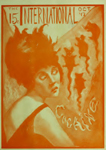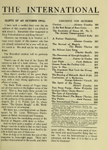100th
MP

|
THE
100th
MONKEY
PRESS |
|
|
|
Limited Editions by Aleister Crowley & Victor B. Neuburg |
|
Bibliographies |
|
Download Texts
»
Aleister
Crowley
WANTED !!NEW!!
|
|
IN THE RED ROOM OF ROSE CROIX |
|
»» Download Text «« |
Image Thumbnails |
|||
|
Title: |
In the Red Room of Rose Croix |
|
||
|
Type of Media: |
Periodical. |
|||
|
Name: |
The International: A Review of Two Worlds. |
|||
|
Issue: |
Volume XI, Number 10. |
|||
|
Date: |
October 1917. |
|||
|
Publisher: |
International Monthly, Inc. |
|||
|
Published At: |
New York. |
|||
|
Pages: |
Page 294. |
|||
|
Price: |
15 Cents. |
|||
|
Remarks: |
|
|||
|
Author’s Working Versions: |
|
|||
|
Other Known Editions: |
|
|||
|
Comments by Aleister Crowley: |
I became a frequent contributor to Vanity Fair. I can never be sufficiently grateful to Frank Crowinshield for his kindness and patience. My association with him is the one uniformly pleasant experience of dealing with editors that I can quote. He always took pains to make the most of his material. If a contribution did not suit him, he did not reject it without a word of explanation. He talked it over, and suggested modifications. I thus found out how to suit his taste without injuring my self-respect. Most editors drive away their best contributors by treating them like street beggars and leave them bewildered at the rejection. Others, again, haggle over the terms and as often as not delay or evade payment. They then wonder why they fail to hit the public taste. It soon goes around that getting a cheque from so-and-so is like fishing for sharks with a trout rod. The editor is tacitly boycotted. This and my work with Evangeline Adams kept me going through the summer. I had a glorious time, what with love and sea bathing. I wrote a good deal of poetry; in particular "The Golden Rose", and a set of lyrics, mostly sonnets to Hilarion, who appears later, in "the Urn", as "the Cat Officer". This woman possessed a unique atmosphere. I can only describe it as "sweetness long drawn out". This translated itself in terms of rhythm. I quote a typical sonnet:
IN THE RED ROOM OF ROSE CROIX
The bleeding gate of God unveils its rose; The cavernous West swallows the dragon Sun: Earth's darkness broods on dissolution, A mother-vulture, nested on Repose. Ah then, what grace within our girdle glows,
To garb thy glee-gilt heart, Hilarion, O scarlet flower, smear honey on the thigh Of this shy bee, that sucks thy sweetness dry, O bower of sunset, bring me to thy sleep Wherein move dreams stained purple with perfumes, Whose birds of Paradise, on Punic plumes, Declare dooms undecipherably deep.
Compare this with any previous sonnet of mine and notice the lusciousness of the lines. — The Confessions of Aleister Crowley. New York, NY. Hill and Wang, 1969. Page 767. |
|||
|
Reviews: |
|
|||



